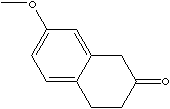| CAS
NO. |
4133-34-0 |

|
| EINECS
NO. |
223-954-1 |
| FORMULA |
C11H12O2 |
| MOL
WT. |
176.21 |
|
H.S.
CODE
|
|
|
TOXICITY
|
|
| SYNONYMS |
3,4-Dihydro-7-methoxy-2(1H)-naphthalenone;
|
| 7-methoxy-1,2,3,4-tetrahydronaphthalen-2-one;
7-Methoxy-1,2,3,4- tetrahydronaphthalin-2-on (German);
7-Metoxi-1,2,3,4-tetrahidronaftalen-2-ona (Spanish);
7-Méthoxy-1,2,3,4-tétrahydronaphtalène-2-one
(French); |
|
SMILES |
|
|
CLASSIFICATION
|
|
|
PHYSICAL
AND CHEMICAL PROPERTIES
|
| PHYSICAL
STATE |
yellow
to brown solid |
|
MELTING
POINT
|
|
| BOILING
POINT |
124 - 126 at 1.5 mm Hg |
| SPECIFIC
GRAVITY |
1.13 |
|
SOLUBILITY
IN WATER
|
Insoluble |
| pH |
|
| VISCOSITY
|
|
| AUTOIGNITION |
|
|
REFRACTIVE
INDEX
|
1.5595 - 1.565 |
| NFPA
RATINGS |
|
| FLASH
POINT |
> 112 C |
| STABILITY |
Stable under normal conditions. |
|
APPLICATIONS
|
| Decalin and tetralin are
the terms that indicate
decahydro- or tetrahydroanaphthalene respectively. They are bicyclic organic
compounds; clear liquid used as solvents for resins.
Hydroanaphthalenes are
produced by hydrogenation of naphthalene in the presence of a catalyst (platinum
catalyst). The commercial decalin is the mixture of cis- and trans- isomers
(typically 77:23) . The trans-isomer is more stable because of less steric
interactions. Hydroanaphthalenes are used as industrial solvents for
naphthalene, resins, oils, and waxes. It features high boiling point and thermal
stability. They are used as components of stove and jet fuels. Hydronaphthalenes
are also used as raw materials of functional polymers. They are used in
preparing dyes, plasticizers, and insecticides. They are also used in heat
transfer fluid, dye carrier, fuel additives, lubricants, ore flotation and
oilfield chemicals. These bicyclic compounds are moieties in transition-metal complex catalysts.
Tetralone
is a keto-hydroanaphthalene
used as a reactive intermediate which is converted
to target compounds including dyes, drugs (contraceptives),
and agrochemicals. The alpha-tetralone has carbonyl group on
the ring at 1 position while beta-tetralone
at 2 position. The different positions
provide various chemical
structures which offer important roles to colours. Tetralone
derivatives find extensive applications in color industry.
Their structures are found in pesticides, fragrances
and antiseptic agents.
|
| SALES
SPECIFICATION |
|
APPEARANCE
|
yellow
to brown semi-solid |
|
CONTENT
|
98.0%
min
|
| TRANSPORTATION |
| PACKING |
200kgs
in drum |
| HAZARD
CLASS |
|
| UN
NO. |
|
| OTHER
INFORMATION |
|
Hazard
Symbols: XI, Risk Phrases: 20/22, Safety Phrases: 36/37 |
